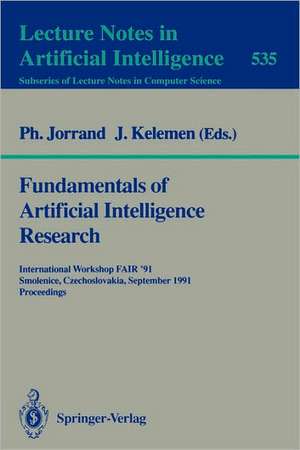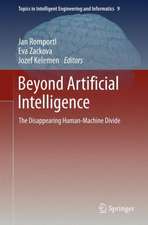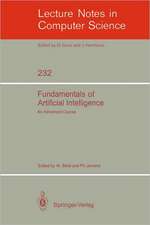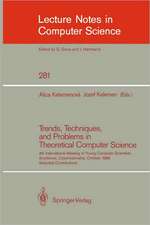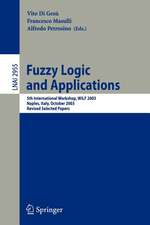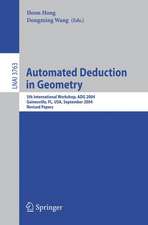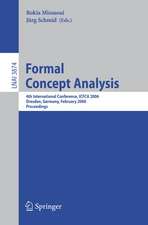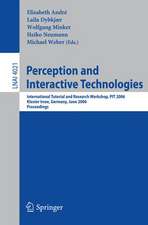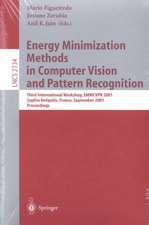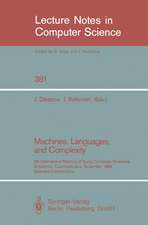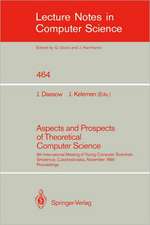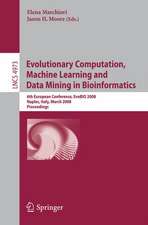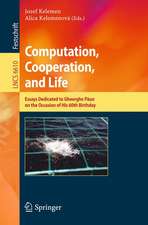Fundamentals of Artificial Intelligence Research: International Workshop FAIR '91, Smolenice, Czechoslovakia, September 8-13, 1991. Proceedings: Lecture Notes in Computer Science, cartea 535
Editat de Philippe Jorrand, Jozef Kelemenen Limba Engleză Paperback – 28 aug 1991
Din seria Lecture Notes in Computer Science
- 20%
 Preț: 1061.55 lei
Preț: 1061.55 lei - 20%
 Preț: 307.71 lei
Preț: 307.71 lei - 20%
 Preț: 438.69 lei
Preț: 438.69 lei - 20%
 Preț: 579.30 lei
Preț: 579.30 lei -
 Preț: 410.88 lei
Preț: 410.88 lei - 17%
 Preț: 427.22 lei
Preț: 427.22 lei - 20%
 Preț: 596.46 lei
Preț: 596.46 lei - 15%
 Preț: 448.04 lei
Preț: 448.04 lei - 20%
 Preț: 353.50 lei
Preț: 353.50 lei -
 Preț: 389.49 lei
Preț: 389.49 lei - 20%
 Preț: 309.90 lei
Preț: 309.90 lei - 20%
 Preț: 645.28 lei
Preț: 645.28 lei - 20%
 Preț: 763.23 lei
Preț: 763.23 lei - 15%
 Preț: 580.46 lei
Preț: 580.46 lei - 20%
 Preț: 310.28 lei
Preț: 310.28 lei - 20%
 Preț: 655.02 lei
Preț: 655.02 lei - 20%
 Preț: 1183.14 lei
Preț: 1183.14 lei - 20%
 Preț: 340.32 lei
Preț: 340.32 lei -
 Preț: 449.57 lei
Preț: 449.57 lei - 20%
 Preț: 591.51 lei
Preț: 591.51 lei - 18%
 Preț: 938.83 lei
Preț: 938.83 lei - 20%
 Preț: 337.00 lei
Preț: 337.00 lei - 20%
 Preț: 649.50 lei
Preț: 649.50 lei - 20%
 Preț: 607.40 lei
Preț: 607.40 lei - 20%
 Preț: 1414.79 lei
Preț: 1414.79 lei - 20%
 Preț: 1024.44 lei
Preț: 1024.44 lei - 20%
 Preț: 583.40 lei
Preț: 583.40 lei - 20%
 Preț: 453.32 lei
Preț: 453.32 lei - 20%
 Preț: 575.49 lei
Preț: 575.49 lei - 20%
 Preț: 1075.26 lei
Preț: 1075.26 lei - 20%
 Preț: 585.88 lei
Preț: 585.88 lei - 20%
 Preț: 825.93 lei
Preț: 825.93 lei - 17%
 Preț: 360.20 lei
Preț: 360.20 lei - 20%
 Preț: 763.23 lei
Preț: 763.23 lei - 20%
 Preț: 340.32 lei
Preț: 340.32 lei - 20%
 Preț: 504.58 lei
Preț: 504.58 lei - 20%
 Preț: 369.13 lei
Preț: 369.13 lei - 20%
 Preț: 580.93 lei
Preț: 580.93 lei - 20%
 Preț: 343.62 lei
Preț: 343.62 lei - 20%
 Preț: 350.21 lei
Preț: 350.21 lei - 20%
 Preț: 583.40 lei
Preț: 583.40 lei - 20%
 Preț: 583.40 lei
Preț: 583.40 lei - 15%
 Preț: 438.59 lei
Preț: 438.59 lei - 20%
 Preț: 341.95 lei
Preț: 341.95 lei - 20%
 Preț: 238.01 lei
Preț: 238.01 lei - 20%
 Preț: 538.30 lei
Preț: 538.30 lei
Preț: 331.25 lei
Preț vechi: 414.07 lei
-20% Nou
Puncte Express: 497
Preț estimativ în valută:
63.40€ • 68.89$ • 53.29£
63.40€ • 68.89$ • 53.29£
Carte tipărită la comandă
Livrare economică 22 aprilie-06 mai
Preluare comenzi: 021 569.72.76
Specificații
ISBN-13: 9783540545071
ISBN-10: 3540545077
Pagini: 272
Ilustrații: VIII, 260 p.
Dimensiuni: 155 x 233 x 14 mm
Greutate: 0.39 kg
Ediția:1991
Editura: Springer Berlin, Heidelberg
Colecția Springer
Seriile Lecture Notes in Computer Science, Lecture Notes in Artificial Intelligence
Locul publicării:Berlin, Heidelberg, Germany
ISBN-10: 3540545077
Pagini: 272
Ilustrații: VIII, 260 p.
Dimensiuni: 155 x 233 x 14 mm
Greutate: 0.39 kg
Ediția:1991
Editura: Springer Berlin, Heidelberg
Colecția Springer
Seriile Lecture Notes in Computer Science, Lecture Notes in Artificial Intelligence
Locul publicării:Berlin, Heidelberg, Germany
Public țintă
ResearchCuprins
User-oriented theorem proving with the ATINF graphic proof editor.- A modal analysis of possibility theory.- Making inconsistency respectable: A logical framework for inconsistency in reasoning, part I — A position paper.- Relational proof systems for some AI logics.- Formal grammars and cognitive architectures.- Efficient simulations of nondeterministic computations and their speed-up by the ring of cooperating machines.- A semantic characterization of disjunctive relations.- Execution of defeasible temporal clauses for building preferred models.- On the phenomenon of flattening “flexible prediction” concept hierarchy.- Possibilistic logic as a logical framework for min-max discrete optimisation problems and prioritized constraints.- An approach to data-driven learning.- Extending abduction from propositional to first-order logic.- Building in equational theories into the connection method.- Logical fiberings and polycontextural systems.- Automated deduction with associative commutative operators.- Towards a lattice of knowledge representation systems.- Inconsistencies handling: nonmonotonic and paraconsistent reasoning.- An approach to structural synthesis of data processing programs.- Negation as failure and intuitionistic three-valued logic.- Symbolic Computation and Artificial Intelligence.
